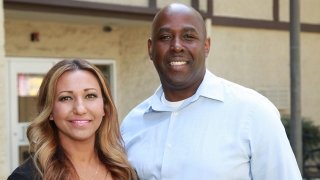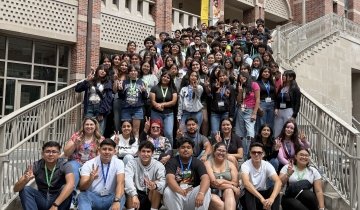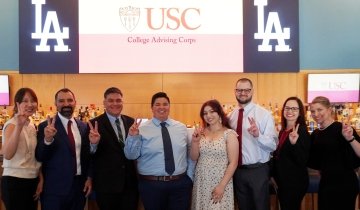The USC Rossier School of Education is opening a new research center dedicated to issues of social justice.
The Center for Education, Identity and Social Justice, or CEISJ, is the brainchild of Associate Professor of Clinical Education Shafiqa Ahmadi and Associate Professor Darnell Cole, who will serve as the center’s co-directors.
The mission of the new center will be to study situations in education involving the cross-section of core identities such as race, gender, religion and culture—often referred to as intersectionality—with the goal of improving the strategies and tools that schools and educators use to address related problems and ensure success for all students.
“Social justice is critical to our foundation as a democracy,” Cole said. “Educational institutions have a tremendous social responsibility to critically engage these ideas and, more importantly, to determine how best to practice them.”
While the tenets of social justice may cause political divides, the co-directors say, the diversity of the country creates a compelling interest to address unjust practices regardless of political affiliation.
“When we close ourselves off, and don’t allow others in, we don’t have meaningful dialogues and an open exchange of ideas that span across communities and cultures,” Ahmadi said. “Intersectionality allows us to connect and understand each other in a more nuanced way, taking into consideration the complexities of our identities.”
As the co-directors noted, the center is coming at a time of unrest in the United States. Executive orders from the Trump administration, including restrictions on immigration from seven Muslim-majority countries, have caused divide and protests around the country.
USC Rossier Dean Karen Symms Gallagher hailed Ahmadi and Cole for tackling some of the most-wicked problems facing the nation.
“We’re at a critical juncture in American history, and we all need to do more work to understand who we are as a people and as a country and how we can relate to each other,” she said. “Shafiqa and Darnell bring exceptional talent to this work, but also a deep passion, and I think their research is going to make a difference on college campuses in the coming years.”
For its first project, CEISJ plans to conduct a survey of more than 100 Muslim college students from California, in order to collect perspectives and experiences they have had in higher education.
“The project is about humanizing Muslim students by giving them the opportunity to tell their own stories as Muslims, as immigrants who are trying to obtain an education and work toward a prosperous life despite many obstacles and struggles that they’ve faced,” Ahmadi said, recalling parallels to her own life as a former refugee from Afghanistan.
“What makes America great are our ideas, our ability to effectively work with very diverse people, unlike many countries that compete with us,” Cole said. “When we do it well, that beacon of hope shines across the world.”
This is the third center USC Rossier has launched during the 2016-17 academic year. CHARIOT, which explores the application of the Internet of Things to classrooms, began in October. In January, USC Rossier announced the USC Race and Equity Center, which is expected to start operations on July 1.




